
Journal of Language Evolution
Scope & Guideline
Illuminating the Path of Linguistic Transformation
Introduction
Aims and Scopes
- Interdisciplinary Research on Language Evolution:
The journal encompasses a wide range of disciplines, including linguistics, cognitive science, anthropology, and evolutionary biology, to investigate the origins and development of language. - Empirical Studies on Communication Systems:
It publishes empirical research examining both human and non-human communication systems, contributing to our understanding of vocal learning, gestures, and other forms of expression. - Methodological Innovations:
The journal encourages innovative methodologies, such as Bayesian phylogenetic analysis and artificial language experiments, to explore linguistic phenomena and their evolutionary implications. - Cultural and Cognitive Influences:
Research that examines the impact of cultural transmission, social dynamics, and cognitive processes on language structure and use is a core focus. - Comparative Analyses across Species:
Comparative studies between human languages and animal communication systems are central, shedding light on the evolutionary pathways that have shaped language.
Trending and Emerging
- Bayesian and Phylogenetic Methods:
There is a notable increase in the use of Bayesian and phylogenetic methods to analyze linguistic data, providing robust frameworks for understanding language evolution and relationships among languages. - Exploration of Non-Human Communication:
Research focusing on vocal learning and communication systems in non-human species, particularly in primates and songbirds, has gained traction, revealing insights into the evolutionary roots of human language. - Cultural Transmission and Language Games:
Studies investigating cultural transmission, including language games and their implications for language structure, are on the rise, highlighting the role of social interaction in language evolution. - Integration of Cognitive Science:
There is an emerging trend toward integrating cognitive science perspectives into linguistic studies, exploring how cognitive processes influence language learning and usage. - Artificial Language Experiments:
The use of artificial languages to study the emergence of linguistic structures and dependency patterns is increasingly popular, offering experimental insights into language formation processes.
Declining or Waning
- Traditional Linguistic Analysis:
There appears to be a waning interest in purely traditional linguistic analyses that do not incorporate evolutionary or cognitive perspectives, as the journal shifts towards more interdisciplinary approaches. - Static Models of Language Change:
Research that relies on static models to explain language change is decreasing, with a preference for dynamic, simulation-based methodologies that account for cultural evolution and interaction. - Descriptive Studies without Evolutionary Context:
Descriptive studies that lack an evolutionary context or fail to address the implications of findings for language evolution are becoming less common, as the journal emphasizes studies with broader relevance.
Similar Journals

Languages
Unveiling the complexities of communication in a global context.Languages, published by MDPI, is a prestigious open-access journal dedicated to the field of Linguistics and Language studies. Since its inception in 2016, this journal has rapidly established itself as a leading platform for high-quality research, achieving an impressive Q1 ranking in 2023 and standing out in both the Arts and Humanities as well as the Social Sciences categories with significant percentile rankings (76th and 74th respectively). Based in Switzerland, Languages fosters an international community of scholars who are committed to exploring the multifaceted dimensions of language, from theoretical frameworks to practical applications. With a robust e-ISSN of 2226-471X, the journal prioritizes accessibility, allowing researchers, professionals, and students to freely engage with cutting-edge research and insights. By bridging the gap between theory and practice, Languages plays a crucial role in advancing our understanding of linguistic phenomena, making it an invaluable resource for anyone invested in the study of language.
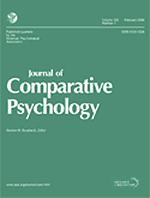
JOURNAL OF COMPARATIVE PSYCHOLOGY
Advancing Insights in Comparative PsychologyJOURNAL OF COMPARATIVE PSYCHOLOGY is a prestigious academic journal published by the American Psychological Association, dedicated to advancing the understanding of behavioral processes across diverse species. With its ISSN 0735-7036 and E-ISSN 1939-2087, the journal has been a cornerstone of comparative psychology research since its inception in 1983. It primarily caters to the fields of ecology, evolution, and behavior, ranking impressively in the Q2 quartile in the category of Ecology, Evolution, Behavior and Systematics, and Q3 in the miscellaneous Psychology category as of 2023. This journal serves as a vital platform for disseminating high-quality research, addressing both fundamental questions and applied issues in systematic studies of behavior across species. Although not open access, its rich repository of research articles, meta-analyses, and reviews makes it an indispensable resource for researchers, practitioners, and students striving to deepen their knowledge and foster innovation in comparative psychological studies. With a commitment to rigorous peer review and scholarly excellence, the JOURNAL OF COMPARATIVE PSYCHOLOGY is a key player in shaping the discourse within its field and driving future research.

Suvremena Lingvistika
Fostering Innovation in Linguistics and Language Studies.Suvremena Lingvistika is a distinguished open-access journal published by the Croatian Philological Society, dedicated to advancing research in the field of linguistics and language. Since its establishment, the journal has been pivotal in promoting scholarly dialogue within the linguistics community, especially among researchers and academics in Croatia and beyond. With an ISSN of 0586-0296 and an E-ISSN of 1847-117X, the journal has transitioned to an open-access model since 2007, ensuring that research is freely accessible to all. As of 2023, it holds a respectable Q3 ranking in the Linguistics and Language category, reflecting its potential contribution to the field. The journal's scope encompasses a wide array of linguistic disciplines, encouraging both theoretical and empirical studies. Supportive of new research, Suvremena Lingvistika aims to foster innovative approaches and methodologies in linguistics, making it an essential resource for students, researchers, and professionals eager to explore the complexities of language. With its ongoing publication until 2024, it continues to shape the linguistic landscape, providing valuable insights and fostering collaboration among scholars globally.
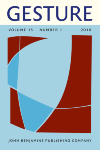
Gesture
Exploring the nuances of non-verbal communication.Gesture, published by JOHN BENJAMINS PUBLISHING CO, is a leading interdisciplinary journal that focuses on the study of human gestural communication as a rich field for linguistic and cognitive research. With an ISSN of 1568-1475 and an E-ISSN of 1569-9773, the journal has been influential since its inception in 2001, providing a vital forum for researchers and professionals studying the interplay between gesture and language. It significantly contributes to various academic fields, evidenced by its remarkable rankings, including Q1 in Cultural Studies and Q2 in Linguistics and Language as of 2023. While it does not offer Open Access, its high impact in scholarly communication makes it indispensable for anyone wanting to explore the nuances of non-verbal expression. The journal maintains a dynamic scope, converging scholarship from 2001 to 2014 and continuing robustly from 2016 to 2024, solidifying its position in the social sciences sector, particularly in the realms of communication, cultural studies, and cognitive psychology. Gesture is published from the Netherlands, and its esteemed reputation ensures that it attracts contributions from top-tier researchers worldwide, making it a crucial resource for advancing knowledge and understanding in the field.
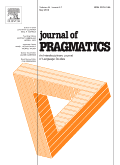
JOURNAL OF PRAGMATICS
Innovating Insights into Language and SocietyJournal of Pragmatics, published by Elsevier, is a premier interdisciplinary journal dedicated to the exploration of language use as a dynamic social phenomenon. Established in 1977 and set to continue through 2024, it serves as a vital resource for researchers across various fields, including Artificial Intelligence, Linguistics, and Language Studies. With an impressive Q1 ranking in Linguistics and Language and a Q2 ranking in Artificial Intelligence, the journal has made significant contributions, supporting a diverse range of theoretical and empirical research. It boasts a solid reputation, evidenced by its strong positions in Scopus rankings—occupying the 91st percentile among the best in the Social Sciences and 92nd in Arts and Humanities. Although it does not currently offer open access, the Journal of Pragmatics remains essential for professionals and scholars seeking to deepen their understanding of pragmatics and its applications in language technology, societal interaction, and cognitive processes. With its international reach and high standards, this journal is a cornerstone for anyone dedicated to advancing knowledge in the fields of language and communication.

Studi e Saggi Linguistici
Exploring Language Through Innovative ScholarshipStudi e Saggi Linguistici is a distinguished academic journal published by EDIZIONI ETS, based in Pisa, Italy. With its ISSN 0085-6827, this journal has established itself as a vital resource in the field of linguistics, particularly noted for its contributions since its inception in 2016. Although currently categorized in the lower quartile (Q4) by the 2023 metrics in the domains of Linguistics and Language within Scopus, it remains a significant platform for innovative research and critical discussions surrounding language studies. Focusing on both theoretical and practical aspects of linguistics, the journal serves as a nexus for scholars and practitioners alike, facilitating a rich interchange of ideas and knowledge in a rapidly evolving discipline. As an invaluable publication for researchers, professionals, and students, Studi e Saggi Linguistici is committed to advancing the understanding of linguistic phenomena and fostering scholarly communication in its field.

Cognitive Studies-Etudes Cognitives
Fostering Inclusive Dialogue in Linguistics and CognitionCognitive Studies-Etudes Cognitives, published by the Polish Academy of Sciences, Institute of Slavic Studies, is a prominent open-access journal based in Poland, dedicated to advancing research in the interdisciplinary fields of cognitive studies, communication, and linguistics. Since its inception, the journal has made a significant impact in the academic community, evidenced by its ranking in the Scopus database within the top 30% for Language and Linguistics. With an aim to bridge theoretical insights and practical applications, Cognitive Studies invites contributions that explore the complex interplay between language, cognition, and technology, making it a vital resource for researchers, professionals, and students alike. As the journal continues to grow, it remains committed to maintaining rigorous standards for publication while fostering an inclusive environment for innovative ideas and diverse perspectives. The journal is easily accessible and aims to facilitate knowledge dissemination, proudly offering open access since 2014.
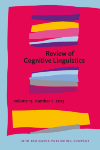
Review of Cognitive Linguistics
Unveiling the Dynamics of Language and CognitionThe Review of Cognitive Linguistics, published by John Benjamins Publishing Co, is a premier academic journal dedicated to the exploration of cognitive approaches to linguistics. With an ISSN of 1877-9751 and E-ISSN 1877-976X, this journal provides a critical platform for researchers and professionals to disseminate their findings in the rapidly evolving fields of linguistics and language, alongside developmental and educational psychology. Hailing from the Netherlands, the journal boasts impressive standing within the academic community, as indicated by its 2023 Q1 ranking in Linguistics and Language and Q3 in Developmental and Educational Psychology. Additionally, its Scopus rankings reflect a strong position within the arts and humanities and social sciences categories. While currently operating under a traditional access model, this journal actively contributes to the overarching discourse within cognitive linguistics, and is a vital resource for those aiming to deepen their understanding of the intricate link between language and cognition. Researchers, educators, and students are encouraged to engage with the rich body of articles spanning its convergence years from 2010 to 2024, making it an essential read for those at the forefront of these interdisciplinary studies.

Journal of Cognitive Science
Illuminating the Pathways of Thought and LanguageThe Journal of Cognitive Science, with ISSN 1598-2327, is a distinguished publication from SEOUL NATL UNIV, INST COGNITIVE SCIENCE, focusing on the multidisciplinary field of cognitive science. Established in 2016, this journal aims to advance knowledge in various domains, including Artificial Intelligence, Cognitive Neuroscience, and Experimental Psychology, while also delving into Linguistics and Language. Although currently categorized in Q4 for several subjects in the 2023 rankings, it presents an invaluable platform for innovative research and scholarly discourse, providing insights that connect cognitive processes with practical applications, thus fostering cross-disciplinary collaboration. Located in South Korea, the journal adheres to rigorous academic standards, inviting submissions that contribute significantly to understanding cognition in a digital age. While it does not offer Open Access, readers can access articles through university libraries and academic databases, engaging with the latest findings and theories that shape the future of cognitive science.
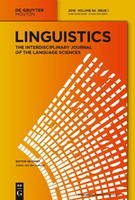
LINGUISTICS
Advancing the Frontiers of Linguistic ResearchLINGUISTICS, published by De Gruyter Mouton, stands as a leading journal in the field of linguistics, exemplifying innovation and scholarly rigor. With its roots tracing back to 1963 and a commitment to advancing linguistic research, this journal has consistently achieved Q1 status in both the Linguistics and Language category, marking it among the top-tier journals in the discipline. The journal is indexed with impressive rankings in Scopus, evidenced by its position within the 84th percentile in Language and Linguistics, and 83rd percentile in Social Sciences, demonstrating its significant influence and reach among scholars. Transitioning to Open Access since 2022, LINGUISTICS enhances accessibility and fosters a wider dissemination of knowledge. Published in Germany and backed by a reputable publisher, LINGUISTICS is dedicated to exploring diverse topics in linguistics, making it essential reading for researchers, professionals, and students aiming to stay at the forefront of linguistic scholarship.